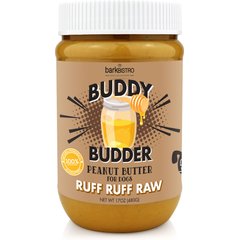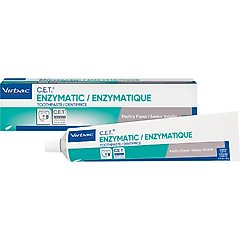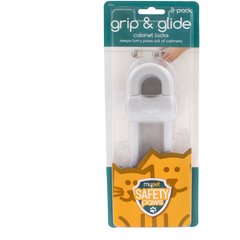9 Signs of Xylitol Poisoning in Dogs—and What To Do

Photo by SolStock/E+ via Getty Images
Xylitol poisoning in dogs is a medical emergency. This common sugar substitute, found in everything from gum to sugar-free peanut butter, can be extremely toxic to dogs, even in small amounts.
Xylitol can cause a sudden drop in blood sugar or even liver failure, and symptoms can come on fast.
Here’s what pet parents need to know, including how to spot the signs, what to do if it happens, and how to reduce the risk of poisoning in the first place.
Key Takeaways
- Xylitol poisoning in dogs is a medical emergency that can cause low blood sugar, liver failure, or death, even in small amounts.
- Symptoms often appear within 30 minutes to a few hours and can progress quickly, so fast action is critical.
- To reduce risk, keep products that contain xylitol out of your dog’s reach and check labels carefully before giving anything to your dog.
What Is Xylitol?
Xylitol, sometimes labeled as birch sugar, is a type of sugar alcohol used as a low-calorie sweetener. It looks and tastes like regular sugar but has fewer calories and less of an impact on blood sugar.
Unlike artificial sweeteners, xylitol occurs naturally in small amounts in some fruits and vegetables, but the kind used in food products is more concentrated. This concentrated form is what can cause toxicity in dogs.
What Foods Contain Xylitol?
Xylitol is usually used in products marketed as sugar-free or diabetic-friendly. This isn’t an exhaustive list, but you can often find the sugar substitute in the following types of foods and products:
Why Is Xylitol Toxic to Dogs?
While xylitol is harmless to humans, dogs have a unique reaction to it. In fact, they’re the only domestic animal in which xylitol poisoning has been reported.
When a dog eats xylitol, it gets rapidly absorbed into their bloodstream. This triggers a release of the hormone insulin that’s three to seven times the normal amount needed to stabilize blood sugar after eating.
This rush of insulin causes a rapid drop in blood sugar levels—a condition called hypoglycemia, according to Robyn Gallucci, DVM, medical director and emergency vet with VEG ER for Pets in Greenville, South Carolina.
Xylitol can also cause liver damage in dogs. The exact mechanism isn’t fully understood, but it’s believed that xylitol may lead to liver cell death, resulting in liver failure that can be life-threatening, says Veronica Villanueva, DVM, medical director at VEG ER for Pets, in Anaheim Hills, California.
How Much Xylitol Is Toxic to Dogs?
What’s especially concerning is that even a tiny amount of xylitol can cause serious harm to dogs.
As little as 45 milligrams of xylitol per pound of body weight can cause hypoglycemia. Higher doses—around 227 milligrams per pound—can lead to liver failure.
To put it into perspective, just one piece of sugar-free gum can be toxic for a small dog, according to Dr. Gallucci.
Because xylitol amounts vary widely between products and toxic levels depend on your dog’s weight, it’s safest to assume that any ingestion is an emergency.
What Are the Signs of Xylitol Poisoning in Dogs?
Xylitol poisoning can happen within 30 minutes to a few hours after ingestion, according to Dr. Villanueva. During that window, symptoms can come on quickly.
Symptoms of xylitol poisoning in dogs include:
What Should I Do if My Dog Eats Something With Xylitol?
If your dog eats something with xylitol, immediately call an emergency veterinarian or the Pet Poison Helpline (855-764-7661, a fee applies)—don’t wait for symptoms.
Symptoms can escalate quickly, so early treatment truly makes all the difference, says Dr. Gallucci.
When you call, be ready with the following information:
- The exact product that was eaten
- How much was eaten
- The time of ingestion
While you might be tempted to do something to help at home, Dr. Villanueva says you shouldn’t try to induce vomiting unless instructed to by a veterinarian. Instead, follow the emergency veterinarian’s recommendations, which will likely include bringing your dog in for treatment and evaluation.
How Do Veterinarians Treat Xylitol Poisoning?
Treatment for xylitol poisoning focuses on managing low blood sugar and protecting the liver. This usually requires a combination of supportive therapies and close monitoring to give your dog the best chance of recovery.
Treatment may include some or all of the following:
- Gastric decontamination: If ingestion occurred recently, vets will use medications and tools to remove as much of the xylitol-containing food or gum from your dog’s stomach and prevent absorption of anything that remains.
- Monitoring: Vets will regularly check your dog’s blood sugar and liver values to watch for signs of hypoglycemia or liver damage.
- Intravenous (IV) fluids: IV fluids may be administered to help stabilize blood sugar levels and provide supportive care.
- Glucose administration: If blood sugar is low, glucose may be given to quickly raise and normalize it.
- Liver support: In cases of liver damage, medications and treatments may be given to support and protect liver function.
- Hospitalization: Depending on the severity of the poisoning, the dog might require hospitalization for continuous monitoring and treatment.
With prompt care, Dr. Gallucci says that many dogs can have a full recovery, especially if they haven’t shown any severe symptoms.
However, if there’s any significant liver damage, the prognosis is more guarded (although recovery is still possible with aggressive care).
That’s why it’s important to get your dog to the emergency vet as soon as you know they’ve eaten xylitol.
How Can I Prevent My Dog From Eating Xylitol?
Preventing xylitol poisoning starts with being proactive and aware. Because xylitol can be found in many everyday items, taking simple steps to keep these products out of your dog’s reach is essential for their safety.
Here are practical tips to help you protect your pup from accidental exposure:
- Store products safely. Keep gum, candy, toothpaste, and other xylitol-containing items in closed cabinets or on high shelves. Never keep them on counters or in bags within reach.
- Always check labels. Scan ingredient lists before sharing human food, especially peanut butter or baked goods. When in doubt, skip it. If you have a very curious pup, you might want to avoid buying xylitol-containing foods altogether.
- Use dog-safe alternatives. Opt for pet products like xylitol-free peanut butter (we like Bark Bistro’s Ruff Ruff Raw Peanut Butter) and dog toothpaste (like Virbac C.E.T.) instead of human versions.
Recommended Products
- Keep trash and recycling secure. Dogs are great at sniffing out food wrappers, chewed gum, and empty containers. Use a trash can with a locking lid or keep it behind closed doors.
- Use child locks if needed. For especially curious pups, installing dog-proof latches on cabinets (like this one from MyPet Safety Paws) or the trash (especially in the kitchen and bathroom) can add an extra layer of protection.
Recommended Product
- Avoid baking with xylitol. If you like to make homemade treats, steer clear of sugar substitutes like xylitol. Stick to dog-safe ingredients.
- Educate your household. Make sure family members and guests know xylitol is toxic to dogs and to keep risky items out of reach.
- Know what to do in an emergency. Save your vet’s number and the Pet Poison Helpline in your phone or on the fridge. Fast action can save your dog’s life.
FAQs About Xylitol Poisoning in Dogs
Q: How do I treat xylitol poisoning in dogs at home?
A: You can’t successfully treat xylitol poisoning in dogs at home. If your dog eats any amount of xylitol, take them to the emergency vet as soon as you can. Don’t give them activated charcoal or try to induce vomiting, unless instructed by a veterinarian.
Q: How long does xylitol poisoning last in dogs?
A: With quick treatment, hypoglycemia can often be managed within a few hours, according to Dr. Villaneuva. However, liver damage can take eight to 12 hours to develop, so your vet might recommend hospitalization for 24–48 hours depending on your dog’s condition, she adds.






